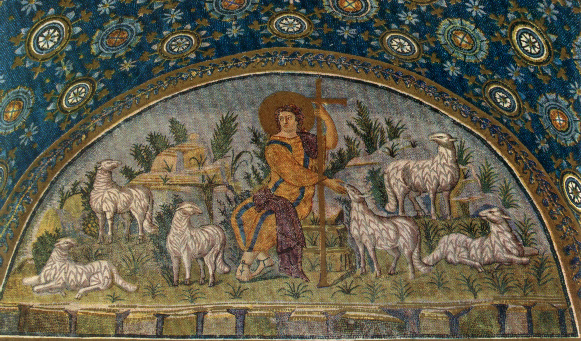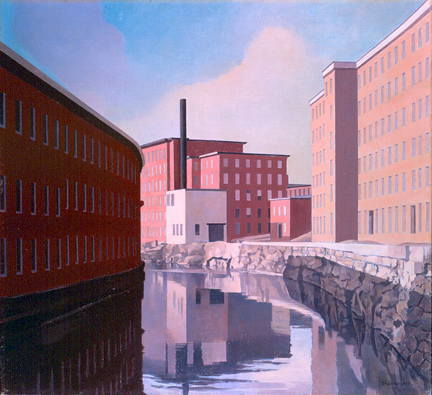 The
impact of technological change on moral virtues, behaviors and beliefs in this automated age.
The
impact of technological change on moral virtues, behaviors and beliefs in this automated age. The
impact of technological change on moral virtues, behaviors and beliefs in this automated age.
The
impact of technological change on moral virtues, behaviors and beliefs in this automated age.
Since the introduction of the clock, the printing press and gunpowder in the middle ages, pastoral & agrarian values are giving and have given way to mechanical and urban measures of worth, appropriate behavior, and punctuality.

The Christian deity has moved from being a "Good Shepard" depicted here from the fifth century AD Roman mosaic to an Enlightenment conception of the "Watchmaker" God of deists.
Some historians argue the roots of modern culture, or modernity lay in the new way of looking at the world that were associated in the Renaissance with painting in perspective.
Modernity can be seen as hip, progressive, and rational; more so than the 1500s.
The cannons in the above 1543 depiction of the Turkish attack on an Hungarian city are reminders of the force with which gunpowder brought to an end the power of the knight on horseback and the feudal support system that sustained knighthood and land as a source of wealth, control and technical superiority over other craft trades of the time since the ancient world.
Pursell sees modernity as the European attempt to dominate less technically advanced cultures after the late 1400s when as Pacey demonstrates the Chinese lead in technical innovation stalled as the Ming dynasty was replaced by the Manchu invaders from the north.
The passing of craft culture due to accelerated use of machinery and application of ever more versatile machines to replace animal and human labor was most evident by the early1800s in France, the United Kingdom, the Netherlands and the United States. Yet even Mexico had the largest weaving factories in the previous century and India, as Pacey examines was both a competitive shipbuilding and textile exporting collection of nations.
Pursell | Pacey–Meaning | Pacey | Postman–Tech | Postman–Television | Eberhart | Snow | Kaku
Industrialization was both a new set of tools brought together and the organization of machinery in ways that converged older machinery with newer discoveries such as mobile steam engines, the electrical telegraph, and the chemical revolution in agriculture, metallurgy, and conveniences such as gas lighting, plumbing and automotive engines.
But critics like Jacques Ellul, Lewis Mumford, and Langdon Winner have argued that machine technology is also profoundly disturbing and Neil Postman says it may lead to:
• Loss of traditional centers of authority
each & all of these above contribute to
Pursell | Pacey–Meaning | Pacey | Postman–Tech | Postman–Television | Eberhart | Snow | Kaku
 What costs are involved in the causal relations among machinery, modernity & our automated way of life?
What costs are involved in the causal relations among machinery, modernity & our automated way of life?
Three significant trends in contemporary technological development that affect our behavior, organization, society, and culture. |
|
 |
|
Amoskeag Canal, Charles Sheeler, 1948. |
|
Kaku on the coming automated revolution and nanotechnology.
Pursell's methodology. | Pursell's structure. | Pursell's analysis of values.
Values are measures of worth and as these measures or social norms are altered by automated tools a new ethos replaces the older set of values that contributed to the agrarian or pre-industrial ethos.
For example: Sacrifice is probably a widespread value associated with religious worship after domestication of plants and animals created an agrarian society based on agriculture that could periodically fail to produce enough food; whereas punctuality was not as widespread an agrarian value and it is far more associated with towns and the mechanization of the technology after the Renaissance.
Ethos the beliefs or manifestation of a particular cultures' set of values, or widely accepted standards, and thus, a guide for its members. It is not always a predictor of acceptable behavior of members in a social arrangement. The aspirations of a group as these express norms, deviations, and mores acceptable to the members of one or another dominant sub-group.
Pacey on landscape | Pursell: conclusion | Time periods
 Three
realms of technology or aspects of technical power.
Three
realms of technology or aspects of technical power.
 |
||
|---|---|---|
| Tools of Toil: what to read. | ||
| Tools are historical building blocks of technology. | ||
Pursell | Pacey–World | Postman | Head | Tenner |Pacey–meaning| Eberhart | Snow | Kaku | Boulding | Delillo | Kranzberg
| Postman–Tech | Postman–Television |